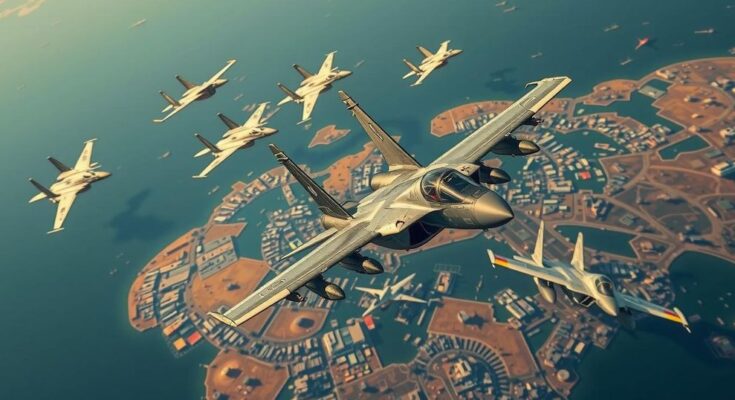Turkey has conducted air strikes in Iraq and Syria targeting the PKK in retaliation for an attack on TUSAS, a defence company, which resulted in fatalities and injuries. The strikes are part of Turkey’s broader campaign against Kurdish militants, reflecting heightened tensions in the region and challenges to potential dialogue regarding Kurdish autonomy.
In a significant military response, Turkey has launched air strikes on Kurdish targets located in Iraq and Syria following a violent attack on the Turkish aerospace and defence company, TUSAS, which resulted in five fatalities and over twenty injuries. The strikes, according to the Turkish Ministry of National Defence, targeted 32 locations purportedly linked to the Kurdistan Workers’ Party (PKK), a group Turkey associates with the recent attack on TUSAS. The Ministry assured that efforts were made to safeguard civilian lives during this operation. The air assaults occurred shortly after suspected PKK fighters detonated explosives and opened fire at TUSAS, a state-run entity engaged in the design and manufacture of military and civilian aircraft as well as unmanned aerial vehicles (UAVs). Turkish Interior Minister Ali Yerlikaya stated that the PKK was likely the perpetrator behind the TUSAS incident. Defence Minister Yasar Guler expressed a resolute stance on confronting the PKK, stating, “We give these PKK scoundrels the punishment they deserve every time. But they never come to their senses. We will pursue them until the last terrorist is eliminated.” No statement has been issued from the PKK following the strikes. Meanwhile, the aftermath of this violence has generated speculation regarding the potential for dialogue aimed at resolving the long-standing conflict, particularly after Devlet Bahceli, the leader of Turkey’s Nationalist Movement Party, raised the prospect of parole for the imprisoned PKK leader, provided he renounces violence. Turkish President Recep Tayyip Erdogan condemned the TUSAS attack during a meeting with Russian President Vladimir Putin at the BRICS summit. The Iraqi embassy in Ankara also denounced the attack, voicing support for Turkey and reaffirming Iraq’s position against terrorism. Turkey routinely conducts air operations against the PKK in Iraq and a Syrian Kurdish faction linked to the group. The TUSAS-produced UAVs have played a crucial role in Turkey’s military engagements in the region, emphasizing the company’s strategic importance in these operations. The conflict with the PKK dates back to the 1980s, having resulted in the deaths of tens of thousands over the years, and the Turkish government categorizes this group as a terrorist organization. The main pro-Kurdish party in Turkey, the DEM, while condemning the violence against TUSAS, highlighted the timing of the attack amidst an emerging dialogue for peace, raising doubts about the current potential for peaceful resolution.
The Turkish military has a long-standing conflict with the PKK, which seeks greater autonomy for the Kurdish population in southeastern Turkey. This conflict has persisted since the 1980s and has resulted in significant loss of life and ongoing violence. TUSAS, as a key defence contractor, provides essential technological support to the Turkish military, including UAVs that have proven effective in countering Kurdish militant activities. The recent attack on TUSAS underscores the volatility of the region and the complex dynamics between Turkish state forces, Kurdish autonomy movements, and international relations with Iraq and external parties like Russia.
In conclusion, Turkey’s recent air strikes against Kurdish targets following the violent attack on TUSAS reflect the ongoing intensity of the conflict with the PKK. The Turkish government maintains a firm stance against Kurdish militants while simultaneously navigating the potential for dialogue regarding Kurdish autonomy. As relations with Iraq continue to develop and external factors influence the situation, questions remain regarding the future of peace negotiations and the stability of the region.
Original Source: www.aljazeera.com




